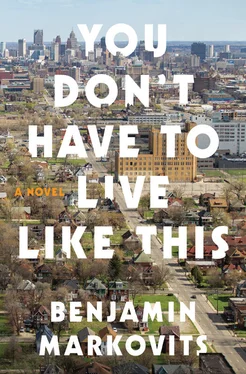“I was Terrell’s friend first, back in high school. Nolan was just his dumb brother.” Mrs. Smith had already gone back to the kitchen.
Nolan liked his wine and brought out wine at dinner, which was a sweet potato stew, made with chicken thighs and pinto beans. The health care bill was just about to come up to the House for the last time, and Gloria said, after tasting her food, “But Nolan, I haven’t told you yet. I met him, I met him.”
“Who?”
“Obama,” she said. “I can’t believe I haven’t told you. He almost broke Marny’s nose.”
“I don’t know it was him,” I said.
“Oh, come on. They were playing basketball, and he got him right in the face.”
“I don’t understand anything about this story,” Mrs. Smith said, so Gloria told her.
“What did you do?” Byron asked me.
“He got beat’s what he did,” Gloria said. “I watched the whole thing. And afterwards I get this towel from the kitchen, to clean him up, and Obama says to me”—she tried to do his voice, but it came out wrong —“This man’s not a whiner, this man’s not a whiner.”
“That’s more Jesse Jackson,” I said. “Obama sounds more like me.”
“Oh please.”
“What do you mean, please . I’ve got more in common with him than you do.”
“Like what?”
“An Adam’s apple,” I said. “You want me to go on?” This is something I’d been thinking about a lot. “I mean, his father’s from one place, his mom’s from another, and he grew up somewhere else altogether. My dad’s Canadian. He spoke French as a kid. My mother comes from the Pacific Northwest. They brought us up in the Deep South, except that the suburb we lived in wouldn’t look out of place in Indiana. Obama and I are the kind of Americans who have to choose what to sound like.”
“You’re crazy,” Gloria said.
But we talked about the health care bill as well. I told them that I had campaigned for Obama in New Hampshire. This was in my tender serious boyfriend’s voice, the one you use for intimate strangers. The people I came across were mostly working-class whites, I said, not quite rural or suburban, but the kind of people who live on the outskirts of poor small towns. The only thing Obama’s election would do is give them an excuse to dislike a black man publicly. Because everybody’s allowed to dislike the president — he’s fair game. They could say whatever they wanted about his health care policy.
“Those people say what they want to anyway,” Nolan said. “You think they give a shit, Marny? You think someone like you’s any better? For people like you he isn’t black, he’s just a Harvard guy .”
After dinner we sat in the living room, and I asked Mrs. Smith who played piano. There was an upright piano pushed between the windows. “My husband bought that for the boys. But they never really played. It’s a shame, Nolan got those musical fingers, nice and long, but all he ever cared about was drawing and throwing that football up and down the block.”
Eventually the wine kicked in and I said, “There’s something I’ve always wanted to ask about the inauguration. You know, when Obama’s kids were standing there, and the Reverend Rick Warren said their names? Sasha and Malia. Like they were some kind of tropical fruit he wanted to take a bite out of. I mean, was that commented on?”
“You mean by black people?”
“I guess so.”
“Yeah, it was weird,” Nolan said. “It was kind of weird.”
Gloria and I walked home together afterwards, about a hundred yards. It was cold enough by that point that she let me put my arm around her; a nice clear end-of-winter night, pretty starry.
“Did I do okay?” I said. “Did I embarrass you?”
“I’m not always testing you,” she said.
“Did you ever go out with Nolan?”
“Oh, please,” she said. “For about a minute. He’s not really my type.”
But I didn’t ask her if she’d slept with him. We spent the night together and the next day together and the next night together. It was all very innocent and low-key. I felt like I was falling in love but maybe not just with her, with something else, another world, but maybe that’s always what falling in love is like.
That was on Friday night. Gloria stayed for the rest of the weekend. On Sunday a seventeen-year-old kid named Dwayne Meacher, riding his bike, stole an iPhone from a man talking on the sidewalk. Not far from Johanna Street, in fact; two blocks away. Meacher got hit by a car immediately afterwards and cracked his head on the asphalt. The roads were still slick; he didn’t have a helmet on. There were differing accounts of what happened, including a disputed confession by the driver to a cop who showed up at the scene three minutes later. For whatever reason, the ambulance took another twenty minutes to arrive.
The first I heard about it was on the local news. Gloria had gone home and I watched the Sunday-evening roundup by myself.
Meacher was knocked out by the fall and remained unconscious in the hospital. The TV report listed his condition as critical; the Detroit Free Press described it as a coma in the morning. I usually took a copy of the paper to class with me, to show my students that history is not only happening all the time but happening locally. Meacher made the front page, but I can’t say anybody mentioned him in the cafeteria until Thursday lunchtime, after The New York Times ran a leader on the story. The Times ’ piece, if you read past the jump, had as much to say about Robert James and his “development model” as it did about Dwayne Meacher. Then The Huffington Post picked up on it, Slate ran something, NewsHour did a story, and the whole shooting match started.
Part of what attracted the talking heads was easy symbolism: the kid on a bike, the vintage car (an old Saab 900 convertible), the iPhone. The fact that the kid was black and the driver was white. Everybody at the scene turned out to be white, except for Meacher and the cops. Columnists and editorial writers used the story to talk about New Jamestown — which is apparently what some people called the new neighborhoods. But after this the name stuck. Robert got a lot of publicity, not all of it bad.
The trouble was, too many people saw something. It was the first warm weekend of the year. There was a yard sale on the block and somebody had put the Tigers game on the radio, probably to show that the radio actually worked. Spring training. People stood around and listened to the game. The guy whose phone was stolen shouted, “Hey, hey you,” and everyone turned to look. Several eyewitnesses insisted that Meacher, trying to escape, biked straight across the road and in front of the car, which swerved to avoid him. Other people said the car swerved into Meacher.
The driver, Tyler Waites, described himself as an “Internet entrepreneur.” We ended up learning a lot about him.
One of the cops reported that Waites had said to him, “I was just trying to get in his way.” But Waites denied this. He said the cop was confusing him with the other guy, whose phone was stolen. I happened to know him — Sandy Brinkman, the playwright from Seattle. Sandy was pretty torn up about the whole thing; his boyfriend was Venezuelan and could pass for black. He said to me a couple of weeks later at Joe’s, “Look, I know what discrimination is.”
“So did you say that Waites was trying to get in his way?”
“Who knows what I said, I was distraught. You know the first thing I did when the kid got hit? I went and picked up my phone — the screen was broken. I’m an asshole . Maybe he’s right. I said to Tomaso, it’s time to atone, baby; it’s time to change our ways. I should fast, I should do something. When you pick up your fucking phone instead of going to the kid. Whatever the papers say about me is right. But I should shut up at least — I’m not supposed to talk about the case.”
Читать дальше












